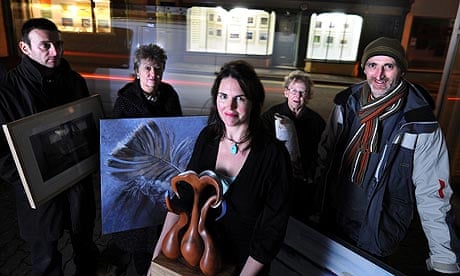To most, the ring of hammer on nail as shop windows are boarded up on Britain's struggling high streets can only mean unemployment and decline. But for a growing band of optimists, it heralds a golden opportunity.
Artists and curators have begun colonising "slack space" freed up by the recession and are transforming vacant shops into "creative squats", galleries and studios.
Former branches of shops including Woolworths and Carphone Warehouse, as well as independent stores, have been colonised to house community cafes and performance art events and promote the work of local artists.
The slack space movement has echoes in previous slumps when many now successful architects, magazine publishers and artists moved into vacant premises. There is certainly room for creativity again. One in six shops will be vacant by the end of the year, according to the data company Experian. It predicts that 72,000 retail outlets could close during 2009, more than doubling the number of empty units to 135,000 in the UK.
In a struggling 1970s shopping centre in Margate, local artists have been allowed to take over about a dozen recently closed stores that sold everything from computer games to fruit and vegetables.
Justin Mitchell and Emily Firmin, who inherited her craft skills from her father Peter Firmin, the creator of Bagpuss, are planning to open a papier-mache workshop in a disused greengrocer's shop. They will produce works in front of shoppers to brighten up other disused shop fronts.
"We are coating the windows with vinyl in bright seaside colours and there will be an aperture in the middle revealing a box in which will be a model suggesting what a shop could become," said Heather Sawney, arts development director at Thanet district council. "There might be a giant lobster to suggest a fishmonger or a huge muffin suggesting a cake shop. We are trying to stimulate people's imagination because in these tough economic times things can become a bit dreary."
"Rather than letting lots of pound shops appear, we are encouraging people to start up businesses," said Firmin. "We know recessions are awful but can be a good time for artists as creative ideas start appearing while otherwise redundant people are sitting at home fiddling and doing creative stuff."
In Dursley, Gloucestershire, artists have colonised a parade of disused shops where they sell their paintings, photographs and ceramics. The flaking window frames of a closed skateboard shop, photography shop and an upholsterer have been repainted and the displays given over to a rotating gallery of 20 artists.
"This part of Dursley has been run down for a long time so moving in here has been a fantastic thing," said Gillie Harris, a painter and textile artist who is occupying the defunct photography shop. "Those of us involved think it could be repeated across England and Wales where the recession is hitting their market towns."
Karen Hillyard, the project co-ordinator, said: "By showcasing local artists we help the regeneration of the town [and] at the same time give the appearance of productivity. There is nothing more dreary than walking through a town with a desolate feel."
The idea of creative reuse of Britain's high street failures is spreading. Ted Cantle, executive chairman of the Institute of Community Cohesion, which advises the government, has called for the conversion of vacant Woolworths stores across the country into modern market halls, populated by farmers' outlets and local businesses. Cantle said it would return vibrancy to struggling town centres in a downturn that he described as an opportunity to loosen the stranglehold of national and multinational brands.
"I'd like to see more local shops and services operating in the high street so there would be more differentiation, say, between Southampton and Sunderland," he said. "The first occupants could be the local farmers who presently have to contend with all weathers on windswept car parks. They could share refrigeration, storage, cash handling and marketing, gaining a prominent daily foothold in the high street, benefiting from the economies of scale."
The branch of Woolworths in Stroud, Gloucestershire, which closed its doors on 6 January, is about to be turned over to artists after the council gained temporary permission to bring it back to life. The town centre manager, Vicky Hancock, plans to hand over the windows to artists. In Dorchester, Claire Robertson, a former Woolworths manager, has spotted a commercial opportunity and is planning to reopen the store as Wellworths, selling pick 'n' mix sweets, toys, home and kitchen items and textiles. She believes she will turn over £2m a year and hopes it will earn the nickname Wellies.
There are likely to be many opportunities to bring new life to old Woolworths stores. Sources close to the deal to dispose of the 800 shops believe up to 200 may not find a tenant within two years.
Slack space
"Slack space" caused by business closures during recessions has provided a foothold for numerous successful businesses. Neal's Yard Remedies, the cosmetics company which now operates across the US and Japan as well as in the UK was established by Romy Fraser in a disused warehouse in Covent Garden, central London, in 1981.
Three years earlier in Bath at the end of the recession of the mid-1970s, a group of architects moved into a recently closed greengrocer's shop before buying the whole building for just £10,000. The firm, now called Feilden Clegg Bradley Studios, last year won the Stirling prize for the best new building by a British architect.
The Roundhouse in Camden, north London, became a thriving cultural venue in the 1960s and 1970s from the hulk of a disused railway shed, while in Manchester in the early 1980s young entrepreneur Tom Bloxham set up a T-shirt business in Affleck's Palace, a fashion market in a disused building in the city's Northern Quarter. He is now the chairman of Urban Splash, a property development firm which had a £57m turnover in 2007.
